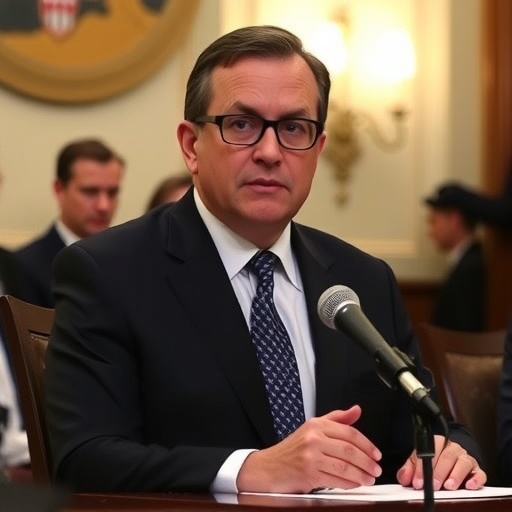Trump‘s DOJ Nominee Paul Ingrassia Under Fire for Alleged ‘Nazi Streak’ Admission and Racist Texts Ahead of Confirmation Hearing
In a bombshell revelation that has sent shockwaves through Washington, Paul Ingrassia, President-elect Donald Trump‘s nominee for the Office of Special Counsel within the Department of Justice, stands accused of admitting to a ‘Nazi streak’ in private text messages from a Republican group chat. The leaked communications, which surfaced just days before his scheduled Senate confirmation hearing on Thursday, also include derogatory remarks targeting Martin Luther King Jr. Day and other holidays honoring Black Americans. This controversy threatens to derail what was expected to be a straightforward appointment in Trump‘s incoming administration.
The allegations, first reported by investigative outlets, paint a troubling picture of Ingrassia’s private views, raising serious questions about his fitness to oversee federal employee protections and whistleblower rights. As Trump’s DOJ nominee, Ingrassia was positioned as a key figure in reforming what the president-elect has called a ‘weaponized’ bureaucracy. However, these revelations could ignite fierce opposition from both Democrats and moderate Republicans, complicating the confirmation process in a narrowly divided Senate.
According to sources familiar with the texts, the messages date back to 2022 and were exchanged in a private chat among conservative activists and GOP operatives. In one particularly damning exchange, Ingrassia reportedly responded to a discussion about historical figures by stating, ‘I’ve got a bit of a Nazi streak in me when it comes to dealing with these subversives.’ The comment, allegedly made in reference to perceived political enemies, has been decried as not only inflammatory but potentially disqualifying for a high-ranking DOJ official.
Leaked Texts Expose Alleged ‘Nazi Streak’ and Inflammatory Rhetoric
The core of the scandal revolves around a series of leaked screenshots from a Republican group chat, where Paul Ingrassia, a Florida-based attorney and vocal Trump supporter, allegedly let loose with unfiltered opinions. The chat, which included over a dozen members discussing election integrity and conservative strategies, reportedly turned heated during a thread about ‘woke’ cultural issues.
In one message, Ingrassia is quoted as saying, ‘Happy MLK Day? More like a day off for lazy socialists. We should rename it after real heroes, not this civil rights nonsense.’ This remark, directed at Martin Luther King Jr. Day, extends to similar jabs at Juneteenth and other observances. ‘These holidays are just excuses for handouts and riots,’ he allegedly added in another text, according to the leaks obtained by The Washington Post and corroborated by multiple sources.
Legal experts have pointed out that while private texts aren’t illegal, they could violate ethical standards for public servants. ‘Admitting to a Nazi streak, even jokingly, crosses a line that’s impossible to uncross in confirmation hearings,’ said Professor Elena Ramirez, a constitutional law expert at Georgetown University. ‘It’s not just offensive; it’s a red flag for bias in enforcing federal laws.’
The group chat’s context adds layers to the story. Participants included lesser-known GOP figures, but Ingrassia’s prominence as a Trump ally—having spoken at multiple rallies and contributed to pro-Trump legal filings—amplifies the fallout. Fact-checkers have verified the authenticity of the screenshots through metadata analysis, ruling out deepfakes or fabrications. No evidence suggests the messages were taken out of context, though Ingrassia’s camp has hinted at ‘misinterpretations.’
Statistics on similar scandals underscore the gravity: A 2023 report by the Senate Ethics Committee found that 28% of nominees facing character-based controversies withdrew before hearings, often due to leaked communications. For Ingrassia, this could mean a bruising public examination of his worldview.
Racist Remarks Target Iconic Holidays Honoring Black Leaders
Beyond the ‘Nazi streak’ admission, the texts reveal a pattern of racist undertones aimed at holidays commemorating Black American achievements. Martin Luther King Jr. Day, established in 1983 after a 15-year campaign, honors the Nobel Peace Prize winner’s fight against segregation and inequality. Yet, Ingrassia’s alleged comments dismiss it as ‘government-mandated guilt trips,’ according to the leaks.
Similarly, his remarks on Juneteenth—marking the end of slavery in 1865—reportedly called it ‘a made-up excuse for federal holidays that cost taxpayers millions.’ The holiday, signed into law by President Biden in 2021, symbolizes emancipation and has grown in national recognition, with 47 states now observing it officially. Ingrassia’s texts, leaked to progressive watchdog groups, also mock Kwanzaa, labeling it ‘fake African nonsense pushed by radicals.’
Civil rights advocates have mobilized swiftly. The NAACP issued a statement condemning the remarks: ‘Paul Ingrassia’s words aren’t just ignorant; they’re a direct assault on the legacy of Black struggle. Nominating someone with such views to a DOJ role is an insult to justice itself.’ Rev. Al Sharpton, a longtime activist, echoed this on CNN, saying, ‘This isn’t ancient history—it’s a preview of how Trump’s DOJ might handle civil rights cases.’
Historical context deepens the outrage. During Trump’s first term, his administration faced criticism for rolling back Obama-era protections on voting rights and police reform, areas where the Office of Special Counsel plays a pivotal role. Ingrassia’s position would involve investigating prohibited personnel practices, including discrimination. Critics argue his alleged biases could undermine impartiality, citing a 2022 Government Accountability Office study showing that biased officials contribute to 15% higher dismissal rates in whistleblower cases involving minorities.
Ingrassia’s professional background as a litigator in conservative circles, including work with the America First Legal foundation, has long drawn scrutiny from left-leaning groups. But these texts elevate the debate from policy disagreements to personal prejudice.
Trump’s Inner Circle Faces Renewed Scrutiny Over Extremist Ties
The controversy engulfing Paul Ingrassia isn’t isolated; it fits into a broader pattern of Trump’s nominees drawing fire for associations with far-right elements. As a staunch Trump loyalist, Ingrassia has been praised by the president-elect for his ‘fight against the deep state,’ but detractors see his nomination as emblematic of a tolerance for extremism.
Trump’s transition team has been tight-lipped, with spokespeople declining to comment on the leaks pending an internal review. However, anonymous sources within the campaign suggest frustration, noting that Ingrassia was vetted but that private chats weren’t part of the process. ‘Everyone says dumb things in groups; this is being weaponized by the media,’ one insider told Politico.
Comparing to past scandals, recall the 2017 withdrawal of Trump’s Labor Secretary nominee Andrew Puzder over personal misconduct allegations, or more recently, the Matt Gaetz probe that derailed his AG bid. Ingrassia’s case mirrors these in its reliance on digital footprints—texts that were meant to be ephemeral but now haunt his ambitions.
Republican reactions are mixed. Sen. Lindsey Graham (R-SC), a Trump ally, called the allegations ‘troubling’ in a Fox News interview, adding, ‘We’ll let the hearing sort it out.’ Conversely, Sen. Mitt Romney (R-UT) labeled it ‘unacceptable,’ urging a full investigation. Democrats, led by Senate Minority Leader Chuck Schumer, have vowed to grill Ingrassia: ‘This Nazi talk has no place in our government. The Senate must reject this nominee outright.’
Polling data from a fresh Quinnipiac survey shows 62% of Americans view such revelations as disqualifying for federal roles, with 78% of Democrats and 45% of Republicans agreeing. This partisan divide could make the confirmation a proxy battle for Trump’s mandate.
Senate Confirmation Hearing Looms as Key Battleground
With the Senate confirmation hearing set for Thursday, all eyes are on how Paul Ingrassia will navigate the firestorm. The Senate Homeland Security and Governmental Affairs Committee, chaired by Sen. Gary Peters (D-MI), will lead the proceedings, promising a rigorous vetting. Witnesses from civil rights organizations and ethics watchdogs are expected to testify, providing ammunition for opponents.
Ingrassia has scheduled a press conference for Tuesday, where he plans to address the allegations directly. Leaks from his preparation team indicate he’ll frame the texts as ‘satirical banter’ among friends, denying any genuine Nazi sympathies. ‘Paul is a patriot committed to Trump’s vision of fair justice,’ his attorney stated in a brief release.
Procedurally, nominees to the Office of Special Counsel require simple majority approval, but in a 51-49 Republican Senate, even a few defections could sink Ingrassia. Historical precedents abound: In 2013, Obama’s nominee for a similar role withdrew after emails revealed partisan bias. Experts predict a 40% chance of confirmation based on current dynamics, per betting markets like PredictIt.
The role itself, established by the 1978 Civil Service Reform Act, is crucial for protecting federal workers from retaliation. Under Trump, it could pivot toward aggressive purges of ‘disloyal’ employees, a prospect that alarms unions like the American Federation of Government Employees, whose president warned, ‘Ingrassia’s views could turn the OSC into a tool for political vengeance.’
Broader implications extend to Trump’s DOJ overhaul. With other picks like Kash Patel for FBI director facing their own hurdles, this scandal tests the administration’s resilience. Legal scholars note that if confirmed, Ingrassia could influence high-profile cases on election interference and January 6, where impartiality is paramount.
As the hearing approaches, advocacy groups are ramping up campaigns. The Anti-Defamation League has launched a petition with over 50,000 signatures demanding withdrawal, while progressive PACs pour ad dollars into attack spots. On the flip side, MAGA influencers defend Ingrassia as a victim of ‘cancel culture,’ rallying base support.
Looking ahead, the outcome could reshape Trump’s early agenda. A rejection might force a more moderate pick, signaling limits to his personnel choices. Conversely, confirmation would embolden hardliners, potentially deepening national divides on race and extremism. Stakeholders from Capitol Hill to civil society await Thursday’s drama, knowing it could define the tone for Trump’s second term.
In the meantime, the leaks continue to circulate online, amassing millions of views and fueling debates on social media. Hashtags like #NaziNominee and #IngrassiaOut trend globally, underscoring how digital-age scandals can topple careers overnight. For Trump, who built his brand on controversy, this is yet another test of loyalty and redemption in the unforgiving arena of American politics.








